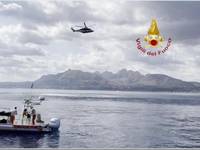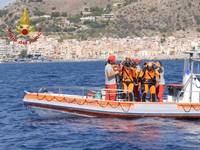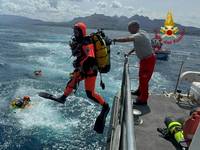Sea Tel 9711 Triband Maritime Antenna System Launched
Satellite 2018 marks the launch of Cobham SATCOM’s Sea Tel 9711 Triband maritime antenna system, which leverages unique technology and capabilities from global communications company Viasat Inc. The Sea Tel 9711 Triband is the world’s first and only 2.4m maritime stabilized antenna capable of delivering full 2.4m gain performance across any C-, Ku-, or Ka-band network to maximize high-speed, high-quality broadband connectivity for high-demand maritime segments, such as Cruise, Energy and Government.
The triband antenna system leverages radio frequency (RF) technology provided by Viasat to enable compatibility across any Ka-band satellite network operating in any orbit. The system offers seamless, automated electronic switching, which provides unmatched operational continuity for vessels with demanding bandwidth, reliability and coverage requirements.
The Sea Tel 9711 Triband maritime antenna system builds on the success of its predecessor, the Sea Tel 9711 IMA C/Ku system, which is positioned as today’s industry standard across the cruise and energy segments. With nearly 1,000 systems in the field, it is the most trusted 2.4m stabilized tracking platform on the market today. The Sea Tel 9711 Triband delivers the same leading radio performance and deep functionality as its predecessor, but with the added flexibility of automatic switching in seconds between all three maritime frequencies. The result is a solution that will dramatically enhance the business case for digital transformation throughout industries operating in the maritime environment.
“Our Sea Tel line of large VSAT systems has been the industry’s first choice among Global Cruise and Energy users for decades,” said Christian Kock, vice president, Maritime Business Unit, Cobham SATCOM. “The 9711 C/Ku antenna enabled a shift from speeds measured in the 10s of Mbps to closer to 1Gbps. The newer triband variant represents a leap forward, not only in terms of bandwidth potential, but also in empowering both our partners and our users to craft unconventional service packages leveraging multiple frequencies, multiple networks, multiple orbits and more. This system is a core building block for what will be the next generation of connectivity at sea.”
The cruise industry leads the way in harnessing IP connectivity for business gains. Over the last 18 – 24 months, a number of major cruise operators have succeeded in showing that maritime internet does not have to be any different from land-based services. Through these efforts, a number of ships today have increased their average bandwidth by as much as 2,000%, with some achieving speeds well over 1Gbps for operational, crew and guest use.
“Cruise ship connectivity is no longer just a means of enabling passengers to email, post photos and make phone calls – it’s much more than that,” said Matt Galston, senior director, Maritime Product Management at Cobham SATCOM. “It’s about a $60b/year segment of the global resort and hospitality industry investing in digital transformation. It’s about distinguishing an experience through insights gained from IoT sensors and real-time analytics. In other words, it’s about maximizing the value of your offering through greater, data-driven customer understanding. This is a trend happening throughout nearly every industry today. The Sea Tel 9711 Triband system is designed specifically to deliver that transformational capability to businesses operating anywhere on the planet.”
For Ka-band operation, the Sea Tel 9711 Triband will be delivered standard fit with a Viasat RF solution. This capability will enable the antenna system to operate on Viasat’s high-capacity satellite networks as well as on any current or future Ka-band satellite constellation, including those operating in Low, Medium and High elliptical orbits. To facilitate practically seamless switching between services in all bands, the new rack-mounted Triband Modem Arbitrator enables out-of-box integration of three separate modems to support different frequencies across different satellite networks all in real-time. The Modem Arbitrator is expandable to support additional modems as well as redundant datacenter configurations.
“Cobham SATCOM’s Sea Tel line represents the gold standard for large maritime systems, and we are excited to be collaborating with them to ensure connectivity across all high-capacity satellite networks,” said Doug Abts, vice president, Global Mobility, Viasat. “Our high quality Ka-band RF components provide the bandwidth, power and flexibility to enable access to any Ka-band satellite system. Additionally, when equipped with a Viasat modem, vessels will be able to access any Viasat-enabled high-capacity satellite network including ViaSat-2, KA-SAT, ViaSat-3 and others.”
The Sea Tel 9711 features the latest 3.0 version of the proprietary Sea Tel Integrated Maritime Antenna (IMA) architecture, which in addition to delivering a number of incremental enhancements will ensure the antenna is capable of seamlessly tracking new constellations as they come online in the next three to five years. The IMA architecture features an Integrated Control Unit (ICU) as a single box electronic control solution to maintain the best and most efficient pointing accuracy. Because the Sea Tel 9711 Triband is based on the established Sea Tel technology platform, Cobham SATCOM is able to offer the ability to upgrade Sea Tel 9711 IMA C/Ku systems to full Triband capabilities.
“Our extensive experience and leadership in this size system has enabled us to offer real value to our partners by creating a path for existing 9711 IMA systems to be upgraded to Triband,” said Kirby Nell, Maritime Product Manager, Cobham SATCOM. “Most important to keep in mind today is that from mid Q2 this year all 9711 IMA systems will come standard with some key new components that allow for easy field upgradability in the future as new constellations come online.”




